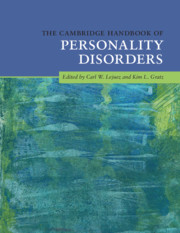Book contents
- The Cambridge Handbook of Personality Disorders
- The Cambridge Handbook of Personality Disorders
- Copyright page
- Contents
- Figures
- Tables
- Contributors
- Preface
- Part I Etiology
- 1 Neuroimaging in Personality Disorders
- 1a A Clinically Relevant Neuroscience for Personality Disorders: Commentary on Neuroimaging in Personality Disorders
- 1b Methodological Advancements Needed in Neuroimaging Research on Personality Disorders: Commentary on Neuroimaging in Personality Disorders
- 1c Illustrating the Value of Neuroimaging Studies Using the Example of Affect Regulation: Author Rejoinder to Commentaries on Neuroimaging in Personality Disorders
- 2 Issues and New Directions in Personality Disorder Genetics
- 2a Four Key Areas for Further Investigation: Commentary on Issues and New Directions in Personality Disorder Genetics
- 2b Highlighting the Value of Dimensional Conceptualizations and Environmental Influences: Commentary on Issues and New Directions in Personality Disorder Genetics
- 2c Questioning Current Directions in Personality Disorder Genetics: Author Rejoinder to Commentaries on Issues and New Directions in Personality Disorder Genetics
- 3 Environmental and Sociocultural Influences on Personality Disorders
- 3a Evidence for Caregiver Factors Proposed by Attachment and Biosocial Theories in the Development of Personality Disorders: Commentary on Environmental and Sociocultural Influences on Personality Disorders
- 3b Towards a Family Process Perspective on Typical and Maladaptive Personality Characteristics: Commentary on Environmental and Sociocultural Influences on Personality Disorders
- 3c Moving Contextual Personality Research Forward: Author Rejoinder to Commentaries on Environmental and Sociocultural Influences on Personality Disorders
- 4 Personality Pathology in Youth
- 4a Toward the Integration of Developmental Psychopathology and Personality Pathology Perspectives: Commentary on Personality Pathology in Youth
- 4b A Developmental Psychopathology Perspective on the Emergence of Antisocial and Borderline Personality Pathologies across the Lifespan: Commentary on Personality Pathology in Youth
- 4c Bridging Diverging Perspectives: Author Rejoinder to Commentaries on Personality Pathology in Youth
- Part II Models
- Part III Individual Disorders and Clusters
- Part IV Assessment
- Part V Treatment
- Index
- References
3c - Moving Contextual Personality Research Forward: Author Rejoinder to Commentaries on Environmental and Sociocultural Influences on Personality Disorders
from Part I - Etiology
Published online by Cambridge University Press: 24 February 2020
- The Cambridge Handbook of Personality Disorders
- The Cambridge Handbook of Personality Disorders
- Copyright page
- Contents
- Figures
- Tables
- Contributors
- Preface
- Part I Etiology
- 1 Neuroimaging in Personality Disorders
- 1a A Clinically Relevant Neuroscience for Personality Disorders: Commentary on Neuroimaging in Personality Disorders
- 1b Methodological Advancements Needed in Neuroimaging Research on Personality Disorders: Commentary on Neuroimaging in Personality Disorders
- 1c Illustrating the Value of Neuroimaging Studies Using the Example of Affect Regulation: Author Rejoinder to Commentaries on Neuroimaging in Personality Disorders
- 2 Issues and New Directions in Personality Disorder Genetics
- 2a Four Key Areas for Further Investigation: Commentary on Issues and New Directions in Personality Disorder Genetics
- 2b Highlighting the Value of Dimensional Conceptualizations and Environmental Influences: Commentary on Issues and New Directions in Personality Disorder Genetics
- 2c Questioning Current Directions in Personality Disorder Genetics: Author Rejoinder to Commentaries on Issues and New Directions in Personality Disorder Genetics
- 3 Environmental and Sociocultural Influences on Personality Disorders
- 3a Evidence for Caregiver Factors Proposed by Attachment and Biosocial Theories in the Development of Personality Disorders: Commentary on Environmental and Sociocultural Influences on Personality Disorders
- 3b Towards a Family Process Perspective on Typical and Maladaptive Personality Characteristics: Commentary on Environmental and Sociocultural Influences on Personality Disorders
- 3c Moving Contextual Personality Research Forward: Author Rejoinder to Commentaries on Environmental and Sociocultural Influences on Personality Disorders
- 4 Personality Pathology in Youth
- 4a Toward the Integration of Developmental Psychopathology and Personality Pathology Perspectives: Commentary on Personality Pathology in Youth
- 4b A Developmental Psychopathology Perspective on the Emergence of Antisocial and Borderline Personality Pathologies across the Lifespan: Commentary on Personality Pathology in Youth
- 4c Bridging Diverging Perspectives: Author Rejoinder to Commentaries on Personality Pathology in Youth
- Part II Models
- Part III Individual Disorders and Clusters
- Part IV Assessment
- Part V Treatment
- Index
- References
Summary
In our rejoinder to the excellent commentaries provided by Macfie, Noose, and Gorrondona (This Volume) and Davies and Thompson (This Volume), we discuss three key directions for research and clinical work that emerge from our chapter on environmental and sociocultural influences on personality disorders. First, it is critical to recognize the importance of early caregiving environments and family processes in the etiology of personality pathology. Second, identifying transactional models that integrate biological, psychological and sociocultural influences may move the field towards a more holistic and multifaceted understanding of the underpinnings of personality pathology. Third and finally, expanding the use of dimensional models of personality pathology may contextualize these transactional relationships and facilitate more rapid advances in our understanding and conceptualizations of (mal)adaptive expressions of personality traits. Dimensional models may further facilitate consideration of socioeconomic, cultural and geopolitical influences in evaluating and defining the maladaptiveness of specific traits and behaviors. Increasing our focus on contextual, environmental, and sociocultural influences in research design, assessment, and case conceptualization will improve personality research and clinical care.
Keywords
- Type
- Chapter
- Information
- The Cambridge Handbook of Personality Disorders , pp. 72 - 73Publisher: Cambridge University PressPrint publication year: 2020

